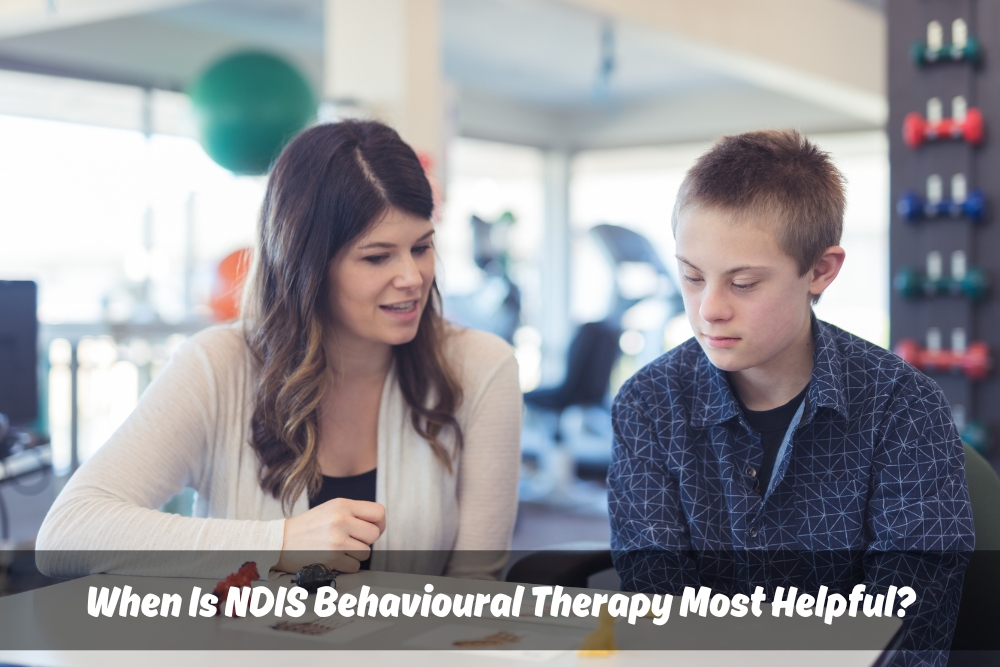Living with a disability can present challenges in various aspects of life. NDIS behavioural therapy can be a powerful tool to navigate these hurdles and improve your overall well-being. But how do you know if it’s the right fit for you? This article dives into the world of NDIS behavioural therapy, exploring its effectiveness in different situations and the benefits it can offer.
What is NDIS behavioural therapy?
NDIS behavioural therapy is a support service funded by the National Disability Insurance Scheme (NDIS) that helps individuals with disabilities develop strategies to manage challenging behaviours. It focuses on identifying the triggers and underlying causes of those behaviours and then implementing techniques to promote positive alternatives. The ultimate goal is to improve a person’s quality of life and independence.
Who can benefit from NDIS behavioural therapy?
This therapy can be beneficial for people with a wide range of disabilities who experience behaviours impacting their quality of life. These behaviours could include:
- Anxiety or social difficulties
- Self-harm or aggression
- Difficulty with communication or routines
- Tantrums or meltdowns

Before embarking on support therapy, it’s crucial to understand if your specific needs align with its approach. Discussing your concerns with a healthcare professional or therapist can help determine if this type of therapy is the most suitable option for you.
When might NDIS behavioural therapy be most effective?
Several factors can influence the effectiveness of support therapy:
- Early intervention for emerging challenges: Addressing behavioural issues early on can be highly beneficial. By understanding and responding to triggers before they escalate, therapy can help prevent negative consequences and establish positive coping mechanisms.
- Addressing specific, targeted goals: Therapy works best when it focuses on specific, achievable goals, like improving communication skills or managing meltdowns. Clear objectives ensure focus and measurable progress.
- Strong support network involved: Therapy is most effective when your support network (family, carers) is actively involved. By learning and implementing the same strategies, consistency is maintained, and positive change is reinforced across environments.
Are there any situations where NDIS behavioural therapy might not be the best fit?
While support therapy can be a powerful tool, it’s important to consider if it’s the best approach for your specific situation. Here are some things to keep in mind:
- Complexities beyond behaviour: If you’re experiencing severe mental health challenges, support therapy might need to be combined with other forms of therapy or medication to address the root cause of the issue.

- Underlying medical factors: In some cases, challenging behaviours might have a physical cause. A medical assessment can help identify any underlying conditions that need to be addressed before diving into therapy.
- Finding the right approach: There’s a range of support therapies available. Discussing your situation with a healthcare professional or therapist can help you determine if a different type of therapy, or a combination of approaches, might be more suitable.
Remember, the best course of action is unique to you. A conversation with a professional about your unique situation can guide you towards the best decision for support therapy and your overall journey.
How can you tell if the therapy is right for you?
There are a few signs that could indicate a positive impact from support therapy:

- Increased ability to communicate needs and wants
- Improved self-regulation and coping skills
- Reduced frequency and intensity of challenging behaviours
- Greater independence in daily activities
- Enhanced social skills and interaction with others
If you notice these improvements, it suggests therapy is playing a positive role in your life.
Are there different types of NDIS behavioural therapy?
NDIS offers a range of behavioural therapies, each with its own approach. Some common types include:
- Applied Behaviour Analysis (ABA) therapy breaks down complex behaviours into smaller, more manageable steps, rewarding positive actions and providing alternative responses to challenging behaviours.
- Cognitive Behavioural Therapy (CBT) focuses on identifying and changing negative thought patterns that contribute to difficult behaviours.
- Positive Behaviour Support (PBS) focuses on creating a supportive environment that prevents challenging behaviours from arising and promotes positive alternatives.
Understanding the different types of NDIS behavioural therapy allows you to choose the approach that best aligns with your specific needs and goals.
What are the benefits of NDIS behavioural therapy?
Support therapy can have a profound impact on the lives of individuals with disabilities and their support networks. Here are some potential benefits:
- Improved communication and social skills: Therapy can equip individuals with better communication tools and strategies to navigate social interactions more confidently.
- Increased independence: By learning to manage challenging behaviours, individuals gain greater independence in daily activities and improve overall quality of life.
- Reduced stress and anxiety: Addressing the underlying causes of challenging behaviours can lead to a significant decrease in stress and anxiety for both the individual and their support network.
- Enhanced relationships: Improved communication and self-regulation contribute to stronger and more positive relationships with family, friends, and carers.
Conclusion
NDIS behavioural therapy is a valuable tool that can help individuals with disabilities develop positive strategies for managing challenging behaviours. Understanding the effectiveness of NDIS behavioural therapy and the potential benefits it can bring allows you to choose confidently if it’s the right approach for you.
Remember, you’re not alone in this journey. There are qualified therapists and disability support workers available to guide you through the process. Don’t hesitate to reach out and explore your options.
Take charge of your wellbeing
Living with a disability can present challenges, but you don’t have to face them alone. Auburn Health, a trusted provider of NDIS behavioural therapy services in Sydney, is here to help. We specialise in creating personalised plans that empower individuals with disabilities to manage behaviours and achieve their goals.
Book your NDIS behavioural therapy consultation with Auburn Health today! We’ll work with you to develop a plan that addresses your unique needs and sets you on the path to positive change.
Get in touch with us today to get started. Together, let’s build a brighter future.


